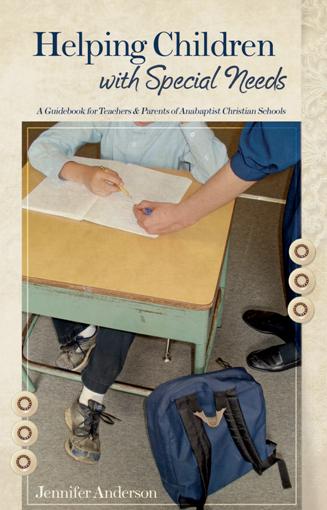Package Discounts
Teacher's Helper Book Pair
Order together and save on shipping.
1. The Teacher's Manual
2. Helping Children with Special Needs
View additional discount options on the package sets page
Overview
Anabaptist day schools face many hurdles when educating children with special needs. This book is an indispensible resource for teachers, who will gain a better understanding of specific disabilities, learn how to develop interventions, and appreciate how God has a place for everyone. This book can also assist parents, Bible school teachers, church members, and school boards, but most importantly, it will help the student become an overcomer.
Details
Pages: 253pp.
Binding: Paperback
Publisher: Ridgeway
Release date: 2013
Edition: First
ISBN: 978-098952980-8
Dimensions: 8.5” x 5.5” x 0.5”
Weight: 0.65lb / 10.48oz
Description
The demands placed on teachers of special needs children go beyond basic academics. They have to be observant, creative, caring, patient, and a yokefellow in leaning. They must teach children how to overcome particular difficulties and how to socialize, taking an active part in the church community. Along with parents, teachers of special needs children prayerfully help all children see the beauty of God’s creative touch in each person’s life.
Helping Children with Special Needs is written to help teachers of Anabaptist Christian day schools understand issues and hurtles that hinder children from learning. The book is a guide for both inclusive and one on one learning environments. The reader will learn about the role of the teacher and the church community in assisting these children to be included in God’s work and kingdom. While looking at specific disabilities teachers will learn how to develop interventions and goals for their children with special needs. They will learn to detect certain medical alerts, respond appropriately when a child bolts, and discern between reliable and unreliable information. This book also explores non-disability special needs that affect learning, such as poverty, medical problems, trauma, broken homes, and cultural differences.
Although primarily written for teachers, this book can also –
· Assist parents of special needs children
· Guide those considering adoption or foster care programs
· Help Bible school teachers and ministries
· Serve as a reference of Board and administration
It can also help –
· Provide clarity for schools as to the nature of a certain disability
· Coordinate the work of school parents, and teachers in adequately addressing needs.
· Set realistic expectations and requirements for teachers
And most importantly, it can help the student be an overcomer.
Table of Contents
Author's Note
Part One: Introduction to Disabilities
The Need for Special Education
Goals for This Book
What Is a Disability?
No Cookie Cutters in God’s Plan
The Teacher's Responsibility: Important Things to Do
Blessing Parents of Children with Special Needs
Factors That Affect Behavior
―Medication
―Self-Injury or Suicidal Thoughts
Guidelines for Discipline
The Church's Responsibility to Provide Special Education
A Note for Parents
―Why Diagnose?
―Medications and Therapies: A Word of Caution
―Doing the Research: What to Ask and I low to Find Scientific Data
―When Home Care Is Needed
―Challenges in Quiet and Public Settings
A Brief Look at the Student: The Mask of Me
Self-Worth
What Not to Do: How We Hurt Our Children with Disabilities
Guidelines for Parochial Special Schools
Part Two: Disabilities and the Church Community
Disabilities in History
Disabilities in the Bible
Disabilities in the Spiritual World
Integrating People with Disabilities into the Church Community
Part Three: Tools for Teaching Children with Disabilities
LRE, IEP, and Transition Plans
Overview of Intervention Development
―Your Purpose When Teaching Children with Special Needs
―Guidelines for Testing
―Accommodating the Needs
――Preschool Intervention and Language
――Health Impairments
――Visual Impairments
――Hearing Impairments
――Physical Impairments
――Behavioral Impairments
――ESL (English as a Second Language) Students
――Learning Disabilities
――Cognitive Impairments Such as Mental Retardation
Developing Social Acceptance
To Pass or Not to Pass: That Is the Question
A Word of Advice Regarding Substitute Teachers
Part Four: Types of Disabilities
Attention Deficit and Attention Deficit Hyperactive Disorders
Attachment Disorders
Autism
Bipolar or Manic Depression
Cognitive Disability
Depression-Related Disorders
Down Syndrome
Dyslexia
Epilepsy and Seizure Disorders
Fragile X or Martin-Bell Syndrome
Hearing Impairments
Metabolic Disorders
―Maple Syrup Urine Disease
―Phenylketonuria
Intellectual Disabilities Due to Toxic Exposure
―Fetal Alcohol Syndrome
―Possible Fetal Alcohol Effect (PFAE)
―Lead Poisoning
―Drugs and Smoking Exposure
―Inhalant Abuse
Obsessive-Compulsive Disorder
Physical Disabilities
―Muscular Dystrophy
―Spina Bifida
―Dwarfism
―Hemiparesis
―Cleft Lip
Schizophrenia
Specific Learning Disability
Tourette Syndrome
Traumatic Brain Injury
Visual Impairments
Other Disorders That Can Affect Learning
―Dysgraphia
―Hyperlexia
―Speech Disorders
Synopsis of Rare Disorders Seen Among Conservative Anabaptists
―Cohen Syndrome
―Congenital Achromatopsia (ACH M)
―Galactosemia
―Glutaric Acidemia Type I
―GM3 Synthase Deficiency
―Microcephaly
―Nephrotic Syndrome
―Septo-Optic Dysplasia (SOD)
―Severe Combined Immunodeficiency Syndrome (SCID)
―Sotos Syndrome
Medical Conditions That Affect Learning
―Diabetes
―Hemophilia
―AIDS and HIV
Part Five: Interventions for Cultural Misunderstandings
Synopsis of Different Socio-Groups
―Asian
―Native American
―Spanish-Speaking Americans
―People of African Ancestry
Understanding in the Classroom
Relating to Children and Families of Diverse Backgrounds
Part Six: When Your Student Has Difficulties at Home
Disruptions in the Traditional Family
At-Risk Students
Single Parent and Divorce/Separation
Substitute Care
Poverty
Childhood Abuse and Neglect
―Physical/Sexual Abuse
―Perversion
―Neglect
―Helping Abused and Neglected Students
Bibliography
Preview
View several sample pages from Helping Children with Special Needs (pdf format). |

